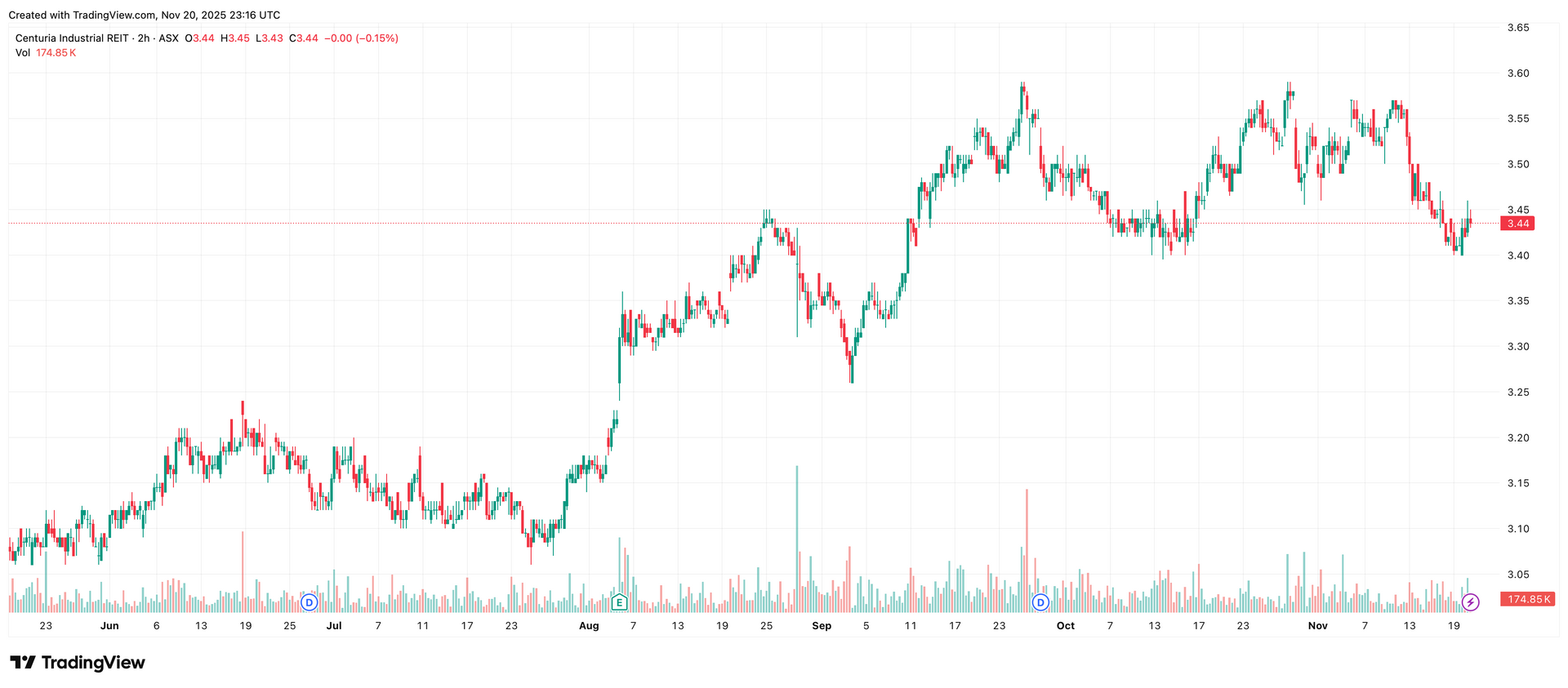Stock Spotlight: Centuria Industrial REIT (ASX:CIP)
Centuria Industrial REIT (ASX: CIP) is Australia's largest listed industrial REIT. It gives investors access to one of the country’s most reliable property portfolios. Its portfolio focuses on the essential fundamentals in Australia’s e-commerce economy, such as logistics hubs, manufacturing facilities, and warehouses.
For SMSF trustees and investors who are income-focused, Centuria shares typically offer stability, consistent payouts, and exposure to structural growth trends such as the rise of digital supply chains and the increased need for last-mile delivery. Its track record speaks for itself. With high occupancy, smart debt management, and long-term leases, CIP has earned its place as a solid anchor among ASX-listed property trusts.
About Centuria Shares
Centuria Industrial REIT is part of the Centuria Capital Group, one of Australia’s leading diversified property fund managers. CIP was established to provide investors with exposure to the Australian industrial real estate sector. It's become a flagship trust that owns and manages assets valued at approximately $3.89 billion as of 21 November 2025. Its footprint covers over 87 properties across major urban and regional centres across Australia.
CIP’s portfolio includes assets and facilities that are strategically located near major roadways, ports, and airports. Their tenants typically include national logistics operators, third-party warehousing providers, and e-commerce retailers. Together, these providers need reliable and easy access to both customers and supply networks. Occupancy remains strong and consistently above 99%, with a weighted average lease expiry (WALE) of around 7.1 years.
This mixture of locations and tenants helps to diversify and reduce risk, while long-term rental contracts provide investors with the opportunity to generate stable income streams.
Why CIP is a Strong Investment Choice
Centuria Industrial REIT has a powerful combination: defensive income with exposure to Australia’s industrial growth narratives. The sector has seen huge demand as businesses prioritise supply chain security, warehouse automation, and closeness to urban centres.
One of CIP’s biggest strengths is its consistent cash generation. Rental increases built into lease agreements help to keep income ahead of inflation, while high occupancy rates and strong tenant covenants support predictable payouts. For investors seeking regular income, these features help to craft the conditions to help secure CIP as a reliable choice in the ASX REIT sector.
CIP's tie-up with Centuria Capital Group brings institutional-grade asset management, disciplined spending, and access to development pipelines. Centuria’s broader platform encompasses a variety of sectors, such as healthcare, office, and unlisted funds, allowing CIP to generate scale and synergies that smaller REITs just don't have access to.
In addition, CIP benefits from the broader macro trends shaping industrial demand. These include the rise of online retail, the return of local manufacturing, and the continued drive for efficiency in logistics. Even with higher borrowing costs, industrial property remains a preferred safe asset for investors seeking consistent yields.
Key Stats
Key Stats
Data as of 08/09/25.
Price Performance
Centuria Industrial REIT’s unit price reflects the wider movements of the Australian property sector. It balances income reliability with a sensitivity to interest rate shifts. During the low-interest-rate environment around the pandemic, REIT valuations benefited from the increased investor appetite for yield, and CIP traded at near its net tangible asset (NTA) value. As interest rates began to increase, property valuations softened, but CIP's rental income held firm — a testament to the quality and resilience of its quality tenant base.
As of 21 November 2025, CIP traded at approximately $3.42 per unit, representing a 12.8% discount to its NTA. This discount may offer an opportunity for long-term investors seeking higher value exposure to income-generating property assets.
Compared to its larger peers, such as Goodman Group (ASX: GMG) or Charter Hall (ASX: CHC), CIP’s focus on core industrial properties rather than the more speculative tone of development projects provides more predictable cash flows. That said, the reduced speculative risk has meant slower share price growth. Through it all, CIP has beaten the S&P/ASX 200 A-REIT Index during periods of rate stability, reflecting the market’s confidence in its reliability for distributions.

Growth Potential
CIP’s growth strategy focuses on the smart buying of assets, redeveloping existing ones, and undertaking energy-efficient upgrades. By ensuring a moderate gearing range of 30-35%, all supported by staggered debt maturity profiles, the trust maintains balance sheet flexibility.
Recent initiatives for CIP include consolidating on many of its portfolio of assets, for example, repositioning some of its older assets into higher-yielding logistics facilities, while expanding holdings in key locations near Sydney and Melbourne. CIP also works closely with Centuria’s development team to enhance land value through a variety of strategies, including selective redevelopment and green-building certifications. This strategy aligns closely with tenant demand for ESG-compliant facilities, while also supporting longer-term valuation growth.
CIP stays close to the megatrends within the industrial real estate sector. These include automation, data logistics, and domestic manufacturing, all supporting demand for industrial assets. CIP’s flexibility to adapt to these trends positions it strongly for consistent portfolio expansion over the medium term.
Upcoming Innovations From Centuria Industrial REIT
Sustainability remains a major focus for Centuria. The trust continues to embed renewable energy systems to reduce carbon emissions across its portfolio. As indications of this commitment, the trust is already rolling out Solar installations, LED retrofits, and efficient water systems across multiple industrial sites.
To support its environmental goals, Centuria is working closely with the latest smart-building innovations to improve operational efficiency and energy reduction. This not only benefits their existing tenants but also reduces long-term maintenance costs and enhances property valuations.
CIP’s commitment to sustainability makes both financial and commercial sense, especially for institutional investors. Mandatory ESG reporting in Australia began in earnest for the largest companies after 1st January 2025. This requirement is being further extended to smaller-sized companies over the next three years.
CIP Dividends & Investor Sentiment
One of the core defining features of Centuria Industrial REIT is its consistent record of payouts. The trust pays quarterly dividends, backed by contracted rental income and conservative payout ratios.
As of 21 November 2025, CIP offered a distribution yield of approximately 4.78% per annum, making it a favourite amongst its peers in the REIT sector. For longer-term investors, this dependable yield offers a buffer during any periods of equity market volatility.
Investor sentiment toward defensive REITs like Centuria has remained steady. While short-term valuation pressure may be unduly affected by higher borrowing costs, many investors continue to view CIP as a reliable anchor for their income-based portfolios. Its combination of yield, sustainability, and tenant quality supports longer-lasting investor confidence.
Investment Tips For Buying Centuria Industrial REIT Units (ASX: CIP)
When assessing CIP as part of a diversified investment portfolio, you’ll want to consider several factors:
- How does its price-to-NTA ratio look? Compare this with other industrial REITs.
- What are the gearing levels? Lower gearing is indicative of enhanced financial resilience.
- What is the tenant quality? Long-term contracts with reputable tenants add stability and consistency.
- Focus on long-term growth. Industrial demand tends to compound gradually but steadily.
Diversify your property exposure. Balancing REIT exposure with equities and bonds can help reduce portfolio volatility.
Key Risks
Centuria Industrial REIT, like so many Industrial REITs, also faces several potential risks:
- Interest-rate sensitivity: Rising borrowing costs have the potential to reduce yields and property valuations.
- Over-reliance on large tenants: Dependence on a few large tenants could expose income to renewal risk.
- Economic downturns: Any downturn in consumer demand will tend to lead to reduced warehouse usage.
- Regulatory and ESG obligations: Upgrading assets to meet sustainability targets could increase expenses.
Understanding these risks helps investors make balanced decisions when allocating capital toward property-based assets.
Frequently Asked Questions.
What does Centuria Industrial REIT actually own?
CIP owns logistics, warehouse, and manufacturing facilities located in strategically important locations across major Australian markets.
How reliable are CIP’s dividend payments?
Dividends have remained stable primarily due to its strong occupancy rates and conservative payout ratios.
How does ASX: CIP compare to other REITs?
CIP offers higher yields but less development-driven capital growth compared to its peers, such as the Goodman Group.
What role does e-commerce play in CIP’s strategy?
E-commerce supports longer-term demand for logistics and distribution hubs.
How sensitive is CIP to interest rates?
It is moderately sensitive, although fixed-rate debt and diversified leases help mitigate those risks.
Is CIP suitable for income portfolios?
Yes, given the reliability of its current performance, although past performance does not guarantee future returns.
Free Stocks Report
Interested in ETF Stocks?
Download our free ETF Stocks Report covering key ASX-listed companies, themes, and analyst insights.

Subscribe to our newsletter
Disclaimer: This article does not constitute financial advice nor a recommendation to invest in the securities listed. The information presented is intended to be of a factual nature only. Past performance is not a reliable indicator of future performance. As always, do your own research and consider seeking financial, legal and taxation advice before investing.











